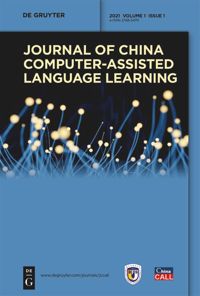The New (Open Access) Journal of China Computer-Assisted Language Learning published its first issue.
The Journal, an initiative of Beijing Foreign Studies University, is the official journal of ChinaCALL, an affiliate of China Association for Comparative Studies of English and Chinese. The journal seeks to provide an international platform for exchanging ideas, innovations and fi ndings regarding computer-assisted language learning. Research articles and critical reviews are especially welcome in related promising fi elds. The journal is peer-reviewed, published in English, open-access and issued twice a year.
My recommended articles for LinguaCop members include:
Ma, Qing and Mei, Fang. “Review of corpus tools for vocabulary teaching and learning” Journal of China Computer-Assisted Language Learning, vol. 1, no. 1, 2021, pp. 177-190. https://doi.org/10.1515/jccall-2021-2008
and
Shrestha, Prithvi N.. “Designing an online business communication course in English by responding to student needs through an evidence-based approach” Journal of China Computer-Assisted Language Learning, vol. 1, no. 1, 2021, pp. 47-79. https://doi.org/10.1515/jccall-2021-2003

